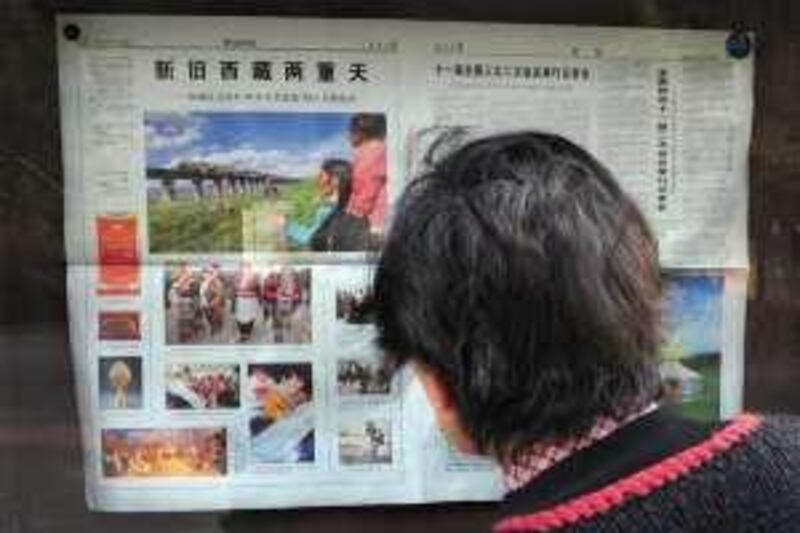BEIJING // The Chinese government is stepping up efforts to tighten its control over Tibet before a number of politically sensitive anniversaries this month, increasing security, restricting the movement of people, making arbitrary detentions and sealing off areas of China with Tibetan populations to the outside world.
Experts say China is seeking to prevent a repeat of last year's unrest, when a crackdown on peaceful protesters in Lhasa, the Tibetan capital, led to uprisings in a number of other Tibetan areas in western China. Adding to the government's concerns is that this month marks the 50th anniversary of the 1959 uprising in Lhasa and the Dalai Lama's escape to India. Woeser, a Tibetan commentator in Beijing, said friends in Lhasa had told her the situation there was very tense, likening the city to a giant prison. "It's extremely frightening," she said. "You can't imagine what will happen next and so people are very afraid."
The government actions are being met with resistance, according to numerous reports leaking out from Tibet and western China. According to one report, Tibetans held a protest in the Lithang region of Sichuan province after a Tibetan monk was arrested on Feb 15 for urging people not to celebrate the Tibetan New Year, which started on Feb 25. Tibetans around the world decided not to celebrate this year, as a mark of mourning for those killed in last year's disturbances.
The Tibet Centre for Human Rights and Democracy said 21 people were detained following the incident in Lithang and that there were two unconfirmed deaths. The centre said hundreds of paramilitaries were sent to the region to put it under lockdown. On Feb 25, monks in the Lutsang monastery, in the Tsolhol Tibetan Autonomous Region in Qinghai province, held a candlelit vigil outside the local government headquarters, according to Radio Free Asia, which said the monastery was now surrounded by armed police.
On Feb 27, a Tibetan monk set himself on fire in protest after the government cancelled Monlam Chenmo, or the Great Prayer Festival, in the Aba county of Sichuan, an area that saw serious unrest last March. The International Campaign for Tibet said the monk, in his 20s, was seen walking from the Kirti monastery into town while carrying a hand-drawn Tibetan flag with a picture of the Dalai Lama in the centre. He suddenly doused himself with petrol and set himself alight.
Also in Aba, 600 monks from the nearby Sey monastery protested on March 1 after they were prevented from carrying out the Great Prayer Festival, it was reported. Tenzin Losel, a researcher in Dharamsala for the International Campaign for Tibet, said there was a huge police and military presence in Lhasa. He said the monasteries there were surrounded by the police, who in some places outnumbered Tibetan pilgrims.
Kate Saunders, of the ICT, said the government measures were unprecedented. "The sheer level of political repression and repercussion is off the scale." Ms Saunders said the continued protests in the face of the official campaign showed that the government's policy towards Tibet was failing. "The extraordinary thing is that these protests have continued despite the harsh crackdown." Human rights organisations have called on Beijing to take steps to reduce tensions. "Resorting to locking down Tibet isn't merely a statement about the security situation there; it's also an admission of failure by the government to effectively address key grievances," Sophie Richardson, the Asia advocacy director at the pressure group Human Rights Watch, said in a statement published on Feb 25.
"Relying exclusively on repressive policies will only lead to increased polarization and resentment, while further jeopardizing genuine stability across Tibet." Human Rights Watch also called on the Chinese government to open Tibetan areas to independent monitors and journalists, to diffuse ethnic tensions and prevent violence in the run-up to this year's scheduled events. The Chinese government recently sealed off Tibet and neighbouring areas inhabited by large numbers of Tibetans to foreign visitors.
Foreign journalists have long been restricted from entering Tibet, except for a handful of government-led tours. In recent weeks, Chinese police have set up road-blocks on motorways leading to monastery towns in Gansu, Sichuan and Qinghai provinces, where protests have been reported. A number of foreign journalists have been expelled recently after being detained in these areas. Tibetans expressed hope that the situation would not deteriorate further, but said this would depend on the government's policy.
They added that if the pressure continues, there could be a popular backlash. "If people are left with no alternative, they have no choice but to strike back," said Woeser, adding that she did not expect the situation to improve until next year. Ms Saunders said the government seemed confident that it could deal with the situation through force, but added that it was clear the policy was making things worse. "The Chinese authorities have seriously misjudged the Tibetan mood," she said. "Until the Chinese Communist Party addresses the deep grievances of the Tibetan people, it's difficult to see how the problem can be resolved." pmooney@thenational.ae





